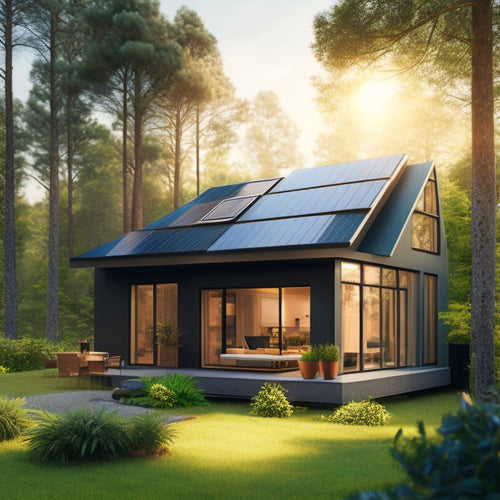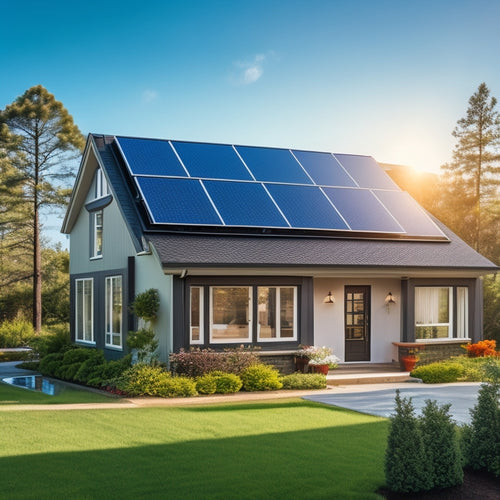
Understanding the Average Cost of Solar Panels and Battery Systems
Share
You're looking to invest in a solar panel system with a battery, and you want to understand the average cost. The upfront cost of solar panels depends on factors like the type and efficiency of panels, system size, and installation quality. On average, a solar panel system can cost between $2.50 and $3.50 per watt, with a typical residential system ranging from $15,000 to $30,000. Adding a battery can increase the cost, with high-quality lithium-ion batteries ranging from $10,000 to $15,000. However, incentives, tax credits, and long-term energy savings can offset these costs. As you assess the costs, you'll want to evaluate how the details of your system will impact your bottom line.
Key Takeaways
- The average cost of solar panels ranges from $2.50 to $3.50 per watt, with monocrystalline panels being more expensive than polycrystalline and thin-film options.
- Solar battery costs range from $8,000 to $12,000, depending on type and quality, with high-quality lithium-ion batteries costing between $10,000 and $15,000.
- System size, installation quality, and price comparisons can significantly impact the overall cost of solar panel installation.
- Government incentives, technology advancements, and market fluctuations can influence system pricing, making it essential to research and compare prices.
- The total cost of a solar panel system can be offset by long-term savings on energy bills, property value increase, and eligibility for federal and state incentives.
Breaking Down Solar Panel Costs
When taking into account a solar panel installation, one of the most significant factors is the upfront cost. You'll need to evaluate the type of solar panels you want to install, as different types have varying price points.
For instance, monocrystalline solar panels are generally more expensive than polycrystalline or thin-film panels. Efficiency ratings also play a role in determining cost, with higher-efficiency panels typically costing more.
You'll also need to factor in the size of your system, as larger systems require more panels and equipment, increasing the overall cost. Additionally, the quality of the installation, including the type of mounting system and inverter used, can impact the final price.
It's crucial to research and compare prices from different manufacturers and installers to find the best option for your budget. By understanding the various components that contribute to the upfront cost, you can make an informed decision about your solar panel installation.
Average Cost of Solar Batteries
You're likely pondering not only the cost of solar panels but also the cost of solar batteries, as they're a vital component of your overall solar energy system.
Solar batteries store excess energy generated by your solar panels during the day for use during the night or on cloudy days, ensuring a stable power supply.
The average cost of solar batteries ranges from $8,000 to $12,000, depending on the type and quality of the battery. A high-quality lithium-ion battery, for instance, can cost around $10,000 to $15,000.
However, it's important to evaluate the long-term benefits, including increased energy efficiency and a longer battery lifespan. A well-maintained solar battery can last up to 15 years or more, making it a worthwhile investment for your solar energy system.
When calculating the cost of solar batteries, it's vital to factor in the total capacity required to meet your energy needs.
A larger capacity battery may be more expensive upfront, but it will provide more power and last longer, ultimately saving you money in the long run.
Factors Affecting System Pricing
The cost of solar batteries is just one aspect of the overall expense of installing a solar energy system. As you consider investing in solar power, it's crucial to understand the various factors that influence system pricing.
Several factors can impact the cost of your solar energy system. These include:
-
Incentives impact: Government incentives, tax credits, and rebates can greatly reduce the upfront cost of your system.
-
Technology advancements: Improvements in solar panel and battery technology can increase efficiency and reduce costs over time.
-
Market fluctuations: Changes in global demand, supply chain disruptions, and trade policies can affect the price of solar panels and batteries.
-
Installation location: The cost of installation can vary depending on your location, with urban areas often having higher labor costs than rural areas.
-
System size: The size of your solar energy system, including the number of panels and batteries, directly affects the overall cost.
Understanding these factors will help you make an informed decision when investing in a solar energy system that meets your needs and budget.
Costs of Installation and Maintenance
Installing a solar energy system requires careful planning and execution, which comes at a cost.
You'll need to evaluate installation options that cater to your specific needs, such as roof-mounted, ground-mounted, or tracking systems. Each option has its unique advantages and disadvantages, affecting the overall installation cost.
In addition to the initial installation cost, you'll need to factor in maintenance expenses. A well-planned maintenance schedule is essential to guarantee your system operates at peak levels. Regular cleaning, inspecting, and replacing worn-out parts will help prevent energy losses and prolong the system's lifespan.
You may choose to perform maintenance tasks yourself or hire a professional, which will impact your overall maintenance costs.
On average, installation costs range from $2.50 to $3.50 per watt, depending on the system size and installation complexity.
Maintenance costs, on the other hand, are relatively low, averaging around $100 to $300 per year.
Return on Investment Analysis
As you've reflected on the costs of installation and maintenance, it's time to examine the financial benefits of going solar. You're likely wondering if the investment will pay off in the long run.
Fortunately, going solar can provide a considerable return on investment (ROI) through various means.
Here are some key factors to reflect on:
-
Increased property value: Installing solar panels can enhance your property's value, making it more attractive to potential buyers if you decide to sell in the future.
-
Reduced energy bills: Solar panels can greatly lower your energy bills, freeing up more money in your budget for other expenses.
-
Federal and state incentives: You may be eligible for incentive programs, such as the Solar Investment Tax Credit (ITC), which can help offset the initial cost of installation.
-
Financing options: Various financing options, such as solar loans and power purchase agreements (PPAs), can make going solar more accessible and affordable.
-
Long-term savings: With a typical lifespan of 25 years or more, solar panels can provide long-term savings on energy costs, making them an important investment for your home or business.
Frequently Asked Questions
Can I Install Solar Panels on My Own to Save Money?
You can attempt a DIY installation to save money, but it's essential to weigh the cost savings against potential risks, ensuring you have the necessary skill and comply with local regulations to avoid voiding warranties or compromising system performance.
Do Solar Panels Work During Power Outages or Blackouts?
Ha! You thought you'd be the eco-hero, saving the day with solar panels during a blackout? Sadly, without a battery system, your panels won't function during power outages, but with one, you'll be blackout-prepared, enjoying electricity while others are left in the dark.
Are There Any Government Incentives for Solar Panel Installations?
You're eligible for federal tax credits covering up to 26% of your solar panel installation costs, and you might also qualify for state rebates, which can greatly reduce your upfront investment in going solar.
Can I Add Solar Panels to My Existing Roof or Do I Need a New One?
When you're looking to 'bite the bullet' and go solar, you'll need to assess your roof's condition before adding panels. If it's in good shape, you can likely install on your existing roof, but if it's nearing the end of its lifespan, you may need a new one to meet installation requirements.
Will Solar Panels Affect the Resale Value of My Home?
You're wondering if solar panels will impact your home's resale value. Research shows that solar panels generally increase home value, making your property more attractive to potential buyers, and you'll likely see a significant rise in resale value.
Conclusion
You've got a clear image of the average cost of solar panels and battery systems, and it's time to take the leap. Don't let the upfront costs rain on your parade - think of them as a drop in the bucket compared to the long-term savings and environmental benefits. With a well-planned installation, you'll be rolling in the green in no time, literally and figuratively. The numbers add up, and it's time to utilize the power of the sun.
Related Posts
-

Top Online Stores for Solar Car Accessories
When searching online for solar car accessories, you'll find top retailers like Amazon, REI Co-op, and Best Buy offer...
-

Reduce Solar Panel Cost for Your Small Home
By evaluating your energy needs, choosing the right installer, and selecting cost-effective solar panel options, you ...
-

Solar Power Units Perfect for Homes
You're considering installing a solar power unit in your home, a decision that can notably reduce your reliance on tr...


